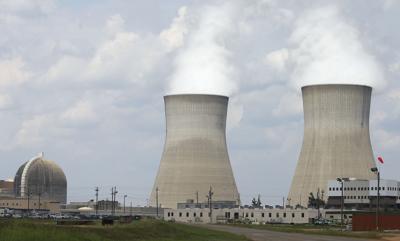(The Center Square) – A bill that seeks to restrict future U.S. imports of Russian uranium cleared the House of Representatives with bipartisan support Monday night.
U.S. Rep. Cathy McMorris Rodgers, R-Wash., who chairs the House Committee on Energy and Commerce, sponsored H.R. 1042, the Prohibiting Russian Uranium Imports Act.
A companion bill, S. 763, is pending in the Senate.
“We hope the Senate will move swiftly to pass this important legislation so it is sent to the President’s desk to become law,” said Rodgers, who represents eastern Washington’s 5th Congressional District, in a press release.
She said the two bills are intended to reduce the United States’ dependence on Russia for unirradiated low-enriched uranium – used as fuel in nuclear reactors for energy generation – while encouraging renewed domestic production of supplies.
“Today, nuclear fuel produced by Russia accounts for more than 20 percent of the fuel used by U.S. reactors,” said McMorris Rodgers. “This has given (Russian President Vladimir) Putin a dangerous amount of leverage over America's energy security. H.R. 1042 will ban these fuel imports from Russia and help restore America’s nuclear leadership and fuel infrastructure.”
U.S. Sen. John Barrasso, R-Wyo., ranking member on the Senate Committee on Energy and Natural Resources, applauded the House’s voice vote passage and urged action by the Senate on S. 763.
“The United States must ban the sale of Russian uranium in America,” Barrasso said in a statement Monday. “Vladimir Putin has used Russia’s nuclear industry to fund his brutal invasion of Ukraine. It is estimated that the U.S. spends roughly $1 billion per year on nuclear fuel from Russia. The legislation that Chair Rodgers and I have sponsored will end our dependence on Russian nuclear fuel.”
As proposed, the bill establishes annual caps on the amount of low-enriched uranium that may be imported from Russia through 2027. However, the U.S. Department of Energy may waive the ban if the agency determines no alternative viable source of uranium is available for continued operation by a domestic nuclear energy company, or if resumption of importation is in the national interest. Any waiver must terminate by Jan. 1, 2028. The bill’s restrictions would end on Dec. 31, 2040.
The bill also would require the Department of Energy to report on the anticipated supply of low-enriched uranium available to replace Russian imports for five years following enactment and any assistance needed by the agency to expand domestic production.
According to the U.S. Energy Information Administration, uranium – a common metal found in rocks all over the world – is the most-commonly used fuel by nuclear power plants for nuclear fission. Economically recoverable uranium reserves are located in the western United States, Australia, Canada, Central Asia, Africa and South America. Uranium production in the U.S. peaked in 1980. But since 1992, most uranium purchased by domestic nuclear power plant operators has been imported.
In 2022, says the EIA, operators of U.S. civilian nuclear power reactors purchased 40.5 million pounds of uranium. The largest providers are Canada (27%), Kazakhstan (25%), Russia (12%), Uzbekistan (11%), Australia (9%), and six other countries combined at 16%.
Along with the U.S., a number of European nations have been reliant on Russian nuclear fuel.
In comments on the House floor Monday, Rodgers said nuclear energy provides nearly 20% of the electricity generated in the United States. But, she said, reliance on cheaper Russian supplies has stunted American nuclear fuel infrastructure and become one of the nation’s most urgent security threats.
Rodgers said the Biden Administration has “also stated that a ban on Russian fuels is necessary to advance our domestic fuel build-out, including the fuels for advanced reactors.”
“This (bill) both protects any short-term needs of the industry and provides the long-term certainty necessary to build out American capacity, as well as European capacity that serves our markets,” she said.
Cosponsors of H.R. 1042 include fellow House Republicans Bob Latta of Ohio, Mariannette Jane Miller-Meeks of Iowa, Jeff Duncan of South Carolina, Debbie Lesko of Arizona, and Victoria Spartz of Indiana.









